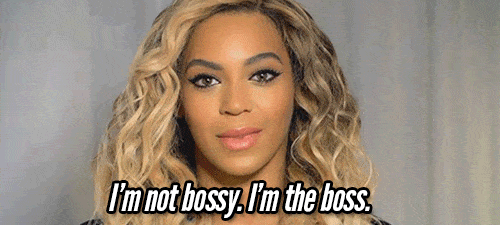Ever since I noticed how few women there were in senior positions, I have been on a mission to ensure women fulfil their potential. I've done research, written books and I coach women at all levels of organisations.
On the one hand, I believe companies and the culture within them have to change, but I also find that talented women who want to get ahead sometimes hold themselves back.
There are enough barriers to success without making it even more difficult for yourself.
To coincide with ELLE's Strong Woman issue with Beyoncé, here are some thoughts from my research and some practical things you can do to prepare yourself for being a strong, confident, successful woman at work:
1. Perfection
The biggest mistake I see women make is trying to be perfect - as a colleague, wife, mother, woman.
They indulge in 'compare and despair' when assessing themselves against other women. People who set the pass mark at 100 per cent spend all their time feeling like failures. It's unrealistic and unattainable.
Decide where your precious time should go, which activities are worth doing and prioritise and delegate wherever you can. Women get silted up trying to do all the mundane stuff, claiming other people won't do things as well as they would. Move on.
Action:
List everything that you believe you have to do in a day. It may take sheets of paper. Go back through the list and decide which of these items is 'want to' and which is 'have to', which you could delegate immediately and which you might have to coach someone to do. Play to your strengths and be strategic about your own career advancement. And by the way, get a cleaner as soon as you can. Don't deprive some other woman of the chance to help her family!
2. Risk taking
Women's aversion to risk sets in around puberty when they become conscious of managing real risk. Watch a woman walk down a street at night and she will be scanning ahead, avoiding dark corners, on alert regarding potential threat.
Being conscious of risk and planning to avoid it at all costs limits your options. Fear of failing will stop you putting yourself forward. Psychologists call it 'anticipatory anxiety' – all that advance worrying about what can go wrong is so destructive.
Optimists succeed not because luck is on their side, but because they work very hard to make sure things come out right rather than focussing on what might conceivably go wrong. Be excited about a new challenge. Be brave. Sometimes you may fail, less than you imagine, but even then you will learn something along the way.
Action:
Take a risk, e.g. Decide to be more visible at work. Make a strategic plan. Go prepared to ask questions in meetings, be bolder in your planned networking and go talk to the people who know how to get on. What's the worst that could happen?
3. Confidence
In all the research I have done, in every conversation I have with really brilliant women, they talk about their lack of confidence. I can tell a woman's confidence level by the way they walk in to a meeting.
I don't think women entirely lack confidence: when women know their stuff, they are confident, sometimes to the point of arrogance. In greyer areas, though, they hold back because of self-doubt and miss out on opportunities that their male colleagues snap up even if they have no idea what they are doing. Low confidence is not a life sentence.
It is worth investing time in by developing a very strong idea of who you are and what you bring to the party and by challenging yourself to move forward. If you want to lead, then think about how a leader acts, looks, walks, talks and above all, thinks.
Action:
Think of a time when you were at your very best. Review what happened and list every strength you demonstrated. These are your signature strengths. Forget about shoring up weaknesses and try using your strengths in every situation you face. This is a much more effective technique than trying to emulate other people.
4. Build the sisterhood
When you first join a company there may be loads of women. But many companies lose 50 per cent of their women every five years.
By the time women are in senior roles, they are often the lone and sometimes lonely women. Used to dealing with men, they often don't notice for a while. Then they begin to get the message that maybe this isn't the place for the likes of them. Keep strong links with women in your field. Look out for and support other women. Build your posse. You'll need them as time goes by.
When you succeed, do not pull up the ladder behind you - make sure you pull other women up after you instead.
In New York, a senior female investment banker told me of her disdain for those women who are always (cue southern drawl) 'kissin' up and pissin' down'. Don't be one of them. Be fierce in your support of other women.
Action:
Build your personal support network with ambitious women you can moan to and laugh with about the vagaries of life, but whom will also know the right time to stop whining, get out there and do something with you.
5. Have a plan
Despite women still having more complex lives than men, they often do not plan their careers as many men would. Women believe that if they do good work then they will be noticed and rewarded and that they shouldn't have to show off about their successes. In an ideal world, that would be true. Sadly, in most companies this really isn't how it works.
If you ask senior women how they got where they are today, they will often tell you they could have accelerated their careers if they had developed a strategy sooner. Things may never work out exactly according to your plan but you can keep making adjustments on the upward trajectory.
Action:
Pick four people whose job you would love to have in five years' time. For each one, map out what you would have to do to get there – belief, development, networking, contacts. This keeps your sights high while you do a good job in your current role, but it turns you into a leader rather than a handmaiden.
6. Use every role model you have available
Women look up through their organisation and they often don't see any women at all, or they see women they classify as 'ball breakers.'
Stop and think what it took for them to get where they are today. They may have had to fight every inch of the way. You may be lucky not to have to use that style, but only because she was a trail blazer before you. Use any woman you have and find ways of making her a role model. If you tell her, she will probably demur and talk about her bad case of imposter syndrome, but do it anyway. Learn from every single woman you encounter - even if it is only to clarify the way you don't want to do it.
Remember that you are a role model to someone else. They are watching you too, so make it count.
Action:
Find role models – if you don't have any in your life, look at women leaders in your field, in the media, at conferences. Study them and the way they handle themselves. Tell them they are your role model and ask how they got where they are and the advice they would give to their younger self. They are usually very busy people, but few will turn you away.
7. Be Careful Who You Have Sex With
This is the advice I give young women who ask about combining a career with children.
Do not even consider the idea until you have had some deep conversations about a partner's views on dual careers and child raising. There is a lot of unconscious bias around, so don't trust that it will all just work out.
Even the most modern men have often not thought about any of this and so some old thinking may emerge at decision time. Don't leave it till you feel vulnerable. Some people have a longer conversation about whether to get a dog than they do about exactly how they will tackle procreation.
If your partner is not just as invested in your career as you are in his, if your finances are not joint and your decisions and investments in childcare are not mutual and fair, there will be trouble ahead. This is too complex an arrangement to assume being in love will make the fairy tale work.
Have a plan. You may find you uncover more unconscious bias than you bargained for but at least you are having the conversation in advance of the challenges.
Action:
Start initial, theoretical conversations and challenge any old fashioned assumptions that you meet.
8. Be authentic to the brand
I have worked with women who have been told to 'dress like a man, talk like a man'. It never really works.
They just feel inauthentic a great deal of the time and it doesn't fool anyone. To be an authentic leader you need to work out what you want to be famous for, rather than trying to be a clone of anyone else.
Start to think of the brand that you are building. Everything you do and say in the workplace is associated with this brand. How you look and act reflects the brand.
Action:
Work out what it is that you stand for, who you truly are and the value you bring to the organisation. Plan how you can make that known.
9. I am a feminist
When people say 'I am not a feminist' I drop my estimate of their IQ by about 20 points.
I presume they have some second hand, sexist concept of feminism and have never really thought about fairness and equality. Equal pay agreed in 1970 will take another 130 years. How's that for progress?
I am often speaking to several hundred amazing women at a time in many different settings and countries and I think 'wow, they could take over the world.' Then they go back to being polite, passive, lacking in confidence, avoidant of risk, not asking for a raise in line with their male colleagues who are doing similar work – being a nice girl is outmoded. All our research on this subject shows shows that people really just don't see what is happening until you point it out.
Action:
Use your emotional intelligence, charm and humour to point out each of the foolish, sexist assumptions or conventions that you will encounter on a daily basis. Hold things up to the light of day.
10. Be a pro
If you want to be a leader, be an expert one. You can never start too soon learning how to do it well.
There has been a belief that leaders are born, rather than made, which rules lots of people out, usually because of their gender. It isn't true though. Start now, working out how to be a skilled and knowledgeable leader. There is plenty of evidence out there about how to lead people so that they want to follow, how to engage people so they give their best, how to play to their strengths for the sake of their success and well being, how to understand what truly motivates people - not just what motivates you.
Equip yourself now so you become known as a great leader. Just remember that women leaders are often held to much higher standards than their male counterparts.
Action:
Start any way you can. Think of good leaders you had in the past. Work out what you liked about working for them. Read around the subject. Act as if you are a leader already, analysing how you do and fine tuning with experience. Just do not be an amateur. Your reports deserve better.
11. A paradigm shift: Your country needs you
Some of the previous generations dropped the ball. Our hopes are are on you now, to be the best you can be, to get to positions of power and then to change the status quo. While this article has been about the individual, there is much wrong with our corporations and our society. It is only when you have a voice and a seat at the table that you can change things for the better.
Softly, softly may be working or may not, but it certainly is not going fast enough. What we need is a paradigm shift – something that causes a rapid change in behaviour.
Think about plastic bags for a moment if you will. In October, a law in the UK required us to pay 5p for a bag. Horror ensued as people who could probably afford 5p stumbled out of shops clutching an assortment of merchandise. Yet by March, we had all learned new behaviours, because the law said we had to and we knew it was right. So a major shift in thinking occurred within six months.
People know women are a good thing, that they are here to stay and have the brains and talent to achieve a great deal of economic and social benefit. That knowledge has not yet changed behaviour in terms of hiring, promoting and retaining women.
Action:
I need your help to think what would change this once and for all so that people like me can get off my soap box. As Justin Trudeau said last year, when questioned about creating a gender-balanced ministerial team: 'because it's 2015.' What can we do so that everyone just says, 'it's 2016, let's get over the fact that 51per cent of the adult population is female,' that women are extremely well educated and contribute hugely to the economy. Let's be a real force for change so you are not apologising to the next generation of girls when they say, 'why is this not fixed yet?'
Averil Leimon is an executive coach, a leadership psychologist, an author and a media commentator. She is a founder of leadership consultancy White Water Group, and a force behind White Water Women.

















